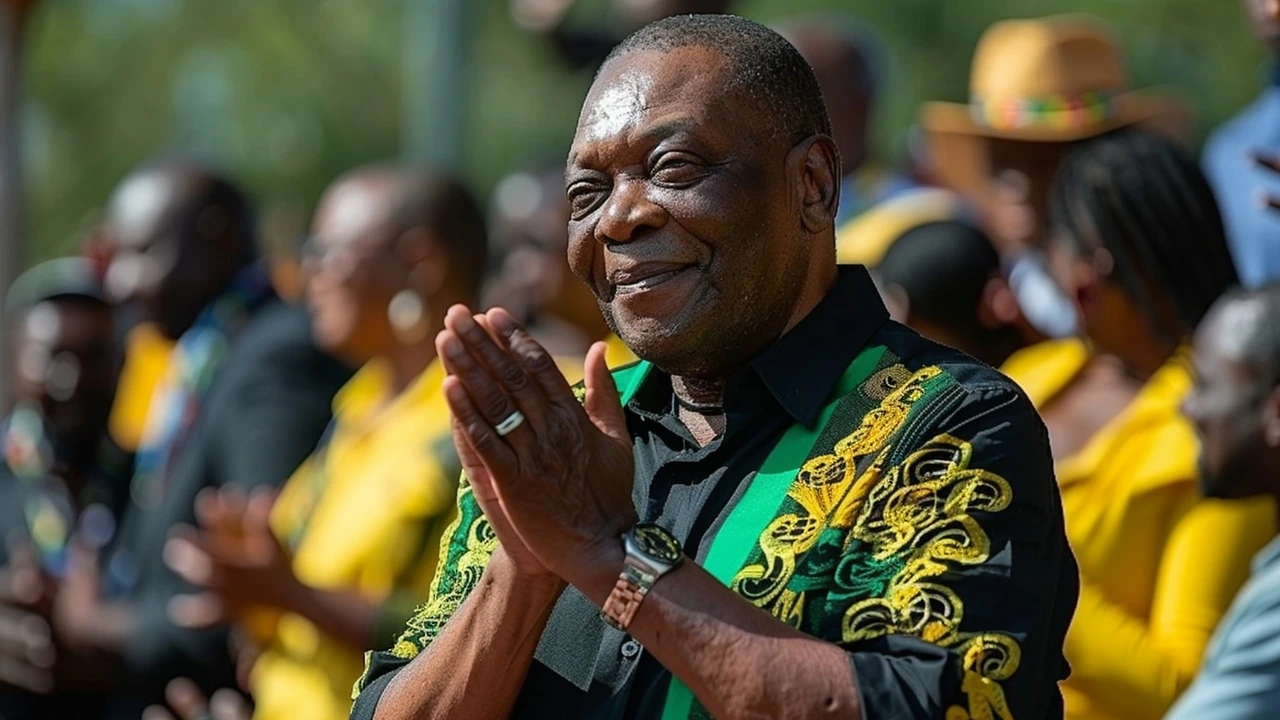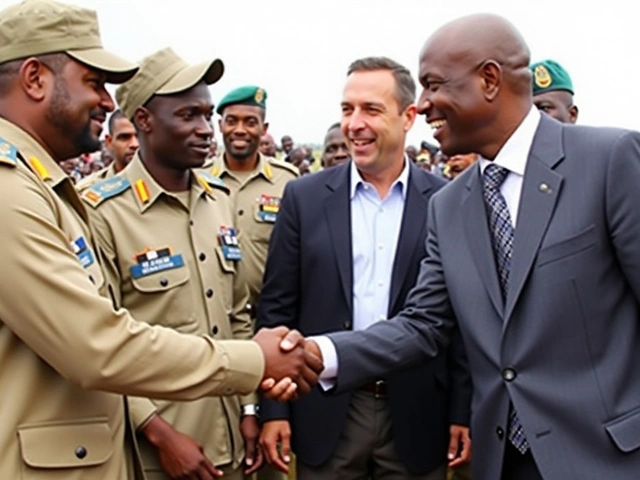DA Accuses President Ramaphosa of Misusing State Resources Ahead of Elections
The Democratic Alliance (DA) has taken legal action against President Cyril Ramaphosa, accusing him of exploiting state resources for electioneering purposes. Alongside the MK party (MKP), the DA has turned to the Electoral Court, alleging that Ramaphosa improperly utilized public funds, specifically targeting recent addresses and infrastructure to boost his party, the African National Congress (ANC), during the pre-election period.
Allegations of Electoral Act Violations
The crux of the DA's argument hinges on what they describe as a blatant misappropriation of state resources. They contend that Ramaphosa's recent address to the nation, ostensibly to discuss governmental achievements, was effectively a campaign speech for the ANC. DA federal chair Helen Zille pointed out that this address closely mirrored a speech Ramaphosa delivered at an ANC rally just the previous day. The DA emphasized that public funds had been used for these activities, which they believe contravenes provisions of the Electoral Act designed to prevent such misuse of taxpayer money for partisan gain.
Potential Penalties and Criminal Charges
The legal implications of these allegations are potentially severe. The DA is seeking a hefty fine of R200,000 and a punitive 1% reduction in the ANC's total votes as consequences for these actions. This demand is grounded in the belief that the alleged offenses undermine the fairness of the electoral process and provide an undue advantage to the ruling party. Furthermore, the DA has not ruled out the possibility of pursuing criminal charges, which could carry significant ramifications, including a potential prison sentence for President Ramaphosa. They argue that his conduct, if proven, constitutes a criminal offense warranting up to 10 years in prison.
Zille’s Argument: A Thinly Veiled Campaign Speech
Helen Zille has been particularly vocal about what she perceives as unethical behavior by the President. She argues that the address to the nation on Sunday was nothing short of a campaign message crafted to gain favor with voters under the guise of a government announcement. Zille asserts that by making this address indistinguishable from his speech at the ANC rally, Ramaphosa blurred the lines between state duties and party activities, thereby crossing a critical ethical boundary.
Broader Implications for ANC and Electoral Integrity
The accusations levelled against Ramaphosa draw attention to broader issues of electoral integrity and the use of state resources. If the Electoral Court rules in favor of the DA's demands, it could set a significant precedent, signaling stricter enforcement of regulations designed to ensure fair play in political campaigns.
Such an outcome would not only be a blow to Ramaphosa and the ANC but could also reverberate through the political landscape, influencing how politicians leverage state platforms and resources in the future. This case has put the spotlight on the need for clear demarcation between governmental duties and party politics, a principle that many argue is crucial for the health of a democracy.
The President's Response
At this stage, there has been no direct response from President Ramaphosa regarding the allegations. Whether his administration will mount a robust defense or seek a settlement remains to be seen. However, the accusations alone have already sparked significant debate, drawing attention to the often murky intersections between government operations and electoral strategies.
Legal and Political Analysts Weigh In
Legal experts and political analysts are closely monitoring this case, highlighting its potential to reshape campaign practices in South Africa. Some analysts argue that if Ramaphosa is found to have violated the law, stringent penalties must follow to deter future misuse of state resources in election campaigns. Others caution that the charges should be carefully scrutinized to avoid setting a precedent that could be used to politically undermine opponents through legal challenges excessively.
Ultimately, this case underscores the ongoing tension between maintaining ethical campaign practices and the competitive nature of political contests. It also invites broader reflections on how democratic systems can best guard against abuses of power and ensure that elections are conducted on a level playing field.
Regardless of the outcome, the allegations against President Cyril Ramaphosa serve as a potent reminder of the importance of transparency, accountability, and fairness in the political arena. As the Electoral Court deliberates, many South Africans will be watching closely, cognizant of the case's implications for the integrity of their electoral system.




We have to hold leaders to the same standards, no matter how high they sit. If the law says state resources can't be used for campaigning, then the penalty must be applied without hesitation.
Ramaphosa’s speech was a blatant power grab! He turned a national address into a campaign rally without a hint of subtlety! Voters deserve transparency not theatrics!
It’s interesting to see how the line between governance and party politics is getting fuzzier. The DA’s move could set a strong precedent if the court backs them. On the other hand, we have to be careful not to weaponize the legal system as a political tool. Either way, the conversation about fair play is finally getting the attention it needs.
Honestly this feels like a textbook case of politicla overreach, a real spectacle of power‑play that would make even the most seasoned cynic raise an eyebrow. The DA is basically saying “enough is enough” and throwing a glittering fine at the party. If you ask me, the penalty should be as massive as the ego behind the misuse. Let’s hope the court sees through the smoke.
This is nothing short of a betrayal of our nation’s values! Using taxpayers’ money to push a party agenda is a slap in the face of every hardworking South African. We must demand a strict punishment to protect the integrity of our democracy. The ANC can’t think it’s above the law.
What if this is just the tip of a deeper scheme to manipulate the whole electoral process? The elites love to hide their moves behind legal jargon while pulling strings behind closed doors. Stay woke folks.
While the allegations are serious, it’s important to consider the broader context, the political tension, and the potential impact on public trust. The legal system should act impartially, ensuring that any penalty is fair and proportionate. At the same time, we should avoid turning this into a witch hunt that further polarizes the nation.
Exactly! Let’s channel that outrage into constructive action – sign petitions, attend court hearings, and keep the pressure on. Energy like this can actually bring change.
When the collective will aligns, even the tallest walls of corruption crumble. It’s a reminder that civic engagement is the true engine of democracy, not just headlines.
The law must be blind.
The principle that law treats everyone equally is the cornerstone of any free society. When a leader blurs the line between state duties and party promotions, it erodes that very principle. The public deserves clarity that the resources they fund are not being turned into a campaign billboard. Judicial oversight acts as a safeguard, reminding officials that power comes with responsibility. If the court imposes a fine, it sends a clear message that abuse will not be tolerated. Moreover, a modest penalty could deter future misuse, preserving the integrity of elections. Conversely, a token punishment might embolden others to test the limits of the law. The notion of reducing a party’s vote share by a fraction may seem dramatic, but it underscores the seriousness of the offense. In democratic theory, proportional penalties aim to restore balance without overstepping into political retribution. It is also crucial that any criminal charges are grounded in solid evidence, not partisan fervor. Transparency throughout the trial will help the public trust the outcome, regardless of the verdict. Citizens can play a role by staying informed, discussing the case, and holding their representatives accountable. Collective vigilance is more powerful than any single protest, as it weaves a fabric of democratic resilience. Remember, change often starts with a single conversation that ripples outward. So keep the dialogue alive, stay engaged, and let justice be the true victor. 🙂
The DA’s lawsuit is just another desperate stunt from the opposition trying to look like they care about democracy while they actually just want to score political points. Their demand for a 1% vote reduction is laughably unrealistic and shows how out of touch they are with the real mechanics of elections.
While the opposition may frame their actions as principled, their rhetoric often masks an underlying agenda to destabilize the governing party. A balanced approach that respects due process while avoiding sensationalism is essential for maintaining national cohesion.
Let’s hope the court makes a fair decision and move forward together.